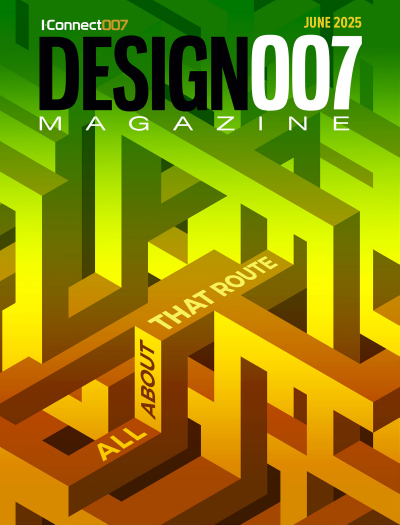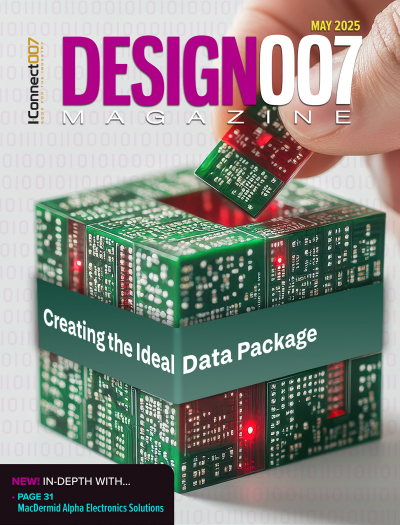-

- News
- Books
Featured Books
- design007 Magazine
Latest Issues
Current Issue
Showing Some Constraint
A strong design constraint strategy carefully balances a wide range of electrical and manufacturing trade-offs. This month, we explore the key requirements, common challenges, and best practices behind building an effective constraint strategy.

All About That Route
Most designers favor manual routing, but today's interactive autorouters may be changing designers' minds by allowing users more direct control. In this issue, our expert contributors discuss a variety of manual and autorouting strategies.

Creating the Ideal Data Package
Why is it so difficult to create the ideal data package? Many of these simple errors can be alleviated by paying attention to detail—and knowing what issues to look out for. So, this month, our experts weigh in on the best practices for creating the ideal design data package for your design.
- Articles
- Columns
- Links
- Media kit
||| MENU - design007 Magazine
NextFlex Project Offers Opportunity to Broaden Awareness of FHE
February 12, 2018 | NextFlexEstimated reading time: 4 minutes
NextFlex, America’s Flexible Hybrid Electronics (FHE) Manufacturing Institute, today announced it has successfully proven the robustness of the FHE manufacturing process, producing multiple functional samples of a flexible Arduino system. As part of the Flexible Arduino Microcontroller Project, NextFlex redesigned a device typically built on a rigid printed circuit board (PCB)—by printing and attaching thin bare die on a flexible substrate while maintaining the performance associated with traditional packaged ICs. This achievement ultimately helps realize FHE’s enormous potential for creating ubiquitous IoT and sensor products for consumer, commercial and military applications.
Arduino is an open-source, microcontroller-based electronics prototyping platform that utilizes versatile, easy-to-use hardware and software. As a result, Arduino has achieved a high degree of popularity with developers ranging from novices to seasoned experts because it is open source, with publicly available design files and bills of materials (BOMs), and low cost. Up until now, however, Arduino products have been built with traditional packaged die microcontrollers, which deliver high performance and functionality, but have design limitations (fragile, rigid, bulky), therefore complicating integration into newer sensor devices that may be flexible or curved in design.
AFRL NextFlex Flexible Hybrid Electronics Arduino FHE
NextFlex tackled this design challenge head on by developing a process flow for manufacturing a flexible Arduino that reduced the number of process steps by almost two thirds when compared with traditional electronics manufacturing processes. NextFlex replaced the traditional circuit board with a thin, flexible plastic sheet and used digital printing processes for circuit elements. Die attach of a thin bare die eliminated traditional microcontroller packaging while further enabling flexibility of the product. The new process translates to an anticipated savings in manufacturing time and cost, as well as a significant reduction in the end-product weight – the flexible Arduino is only a third of the weight of the rigid Arduino Mini board.
The NextFlex Arduino project’s sponsor is the United States Air Force Research Laboratory (AFRL); see announcement here. “The possibilities for FHE technology are virtually limitless,” said Dr. Benjamin Leever, the AFRL Advanced Development Team leader and NextFlex Government Chief Technology Officer. “Proving the manufacturability of this technology through an open-source platform will expand FHE’s reach even further by providing everyone from industrial product developers to high school students with the opportunity to innovate on new electronics concepts.” He added, “We are pleased to have teamed with NextFlex on this project and look forward to the next steps in the optimization process. This is truly a momentous achievement for the FHE community.”
Today’s announcement further underscores NextFlex’s mission to facilitate innovation through collaboration and promote sustainable manufacturing ecosystems. Noted NextFlex Director of Technology Jason Marsh, “Today’s breakthrough would not have been made possible without the tireless efforts, passion and teamwork among the NextFlex and AFRL teams. Being able to demonstrate the process manufacturability of a low-cost, easy-to-deploy and truly flexible platform gives everyone—and by that, I mean EVERYONE that feeds into the Arduino open source developer community—the ability to create and speed to market innovative new products that harness the power of FHE.”
NextFlex's San Jose-based open-innovation Technology Hub proved valuable in allowing NextFlex to integrate all the component steps to yield functioning samples. The Hub is the only single-source FHE processing production line in the U.S., and offers members access to state-of-the-art production equipment for proving new technology, developing new manufacturing processes, and testing new materials. NextFlex first demonstrated a sample flexible Arduino system last September during its annual Innovation Day, where Wilfried Bair, senior engineering manager for device integration and packaging at NextFlex, talked about the creation of the flexible Arduino.
At this week’s 2018FLEX Conference, which runs today through Thursday, February 15, in Monterey, Calif., NextFlex will demonstrate a working Arduino prototype in its booth #1001, and will also show an Arduino board plugged into a tester. According to NextFlex, the next stage will be to optimize each process step for consistent and repeatable process flow, and to conduct reliability testing to ensure the devices meet all usage requirements. To further stimulate interest in the uses for flexible technology, NextFlex CEO Malcolm Thompson will moderate an Applications Panel Discussion during 2018FLEX this afternoon from 4:00-5:30 p.m. More information on the panel can be found here.
About Flexible Hybrid Electronics
FHE gives everyday products the power of silicon ICs by combining them with new and unique printing processes and new materials. The result: lightweight, low-cost, flexible, conformable, stretchable, and highly efficient smart products with innumerable uses for consumer, commercial, and military applications.
About NextFlex
NextFlex, America’s Flexible Hybrid Electronics Manufacturing Institute, is a leading force in the Manufacturing USA network. Formed through a cooperative agreement between the U.S. Department of Defense and FlexTech Alliance, NextFlex is a consortium of companies, academic institutions, non-profits, and state, local, and federal governments with a shared goal of advancing U.S. manufacturing of FHE. Since its formation in 2015, NextFlex's elite team of thought leaders, educators, problem solvers, and manufacturers have come together to collectively facilitate innovation, narrow the manufacturing workforce gap, and promote sustainable manufacturing ecosystems. For more information, click here.
Testimonial
"The I-Connect007 team is outstanding—kind, responsive, and a true marketing partner. Their design team created fresh, eye-catching ads, and their editorial support polished our content to let our brand shine. Thank you all! "
Sweeney Ng - CEE PCBSuggested Items
I-Connect007 Editor’s Choice: Five Must-Reads for the Week
07/25/2025 | Marcy LaRont, I-Connect007In industry news this past week, I’m putting a focus on sustainability in electronics by highlighting my interview with Kelly Scanlon and Corey Dehmey, and Nolan Johnson’s Meet the Author podcast with Beth Turner of MacDermid Alpha Electronics Solutions. I also chose to spotlight the M&A activity and outlook in the U.S. market and regional market news in India and Mexico.
From Factory Floor to ‘The Component Store’
07/25/2025 | Marcy LaRont, I-Connect007Daniel Beauvois began his career in PCB manufacturing 15 years ago with zero industry experience—just a willingness to learn. Daniel immersed himself in every step of circuit board production, from hanging out on the factory floor to giving plant tours. Now, as founder of The Component Store, he’s an independent sales rep known for integrity, persistence, and deep technical knowledge. In this interview, Daniel reflects on his journey, the realities of being an outside rep, and what it takes to earn—and keep—a customer’s trust in an ever-evolving electronics industry.
STMicroelectronics Reports Q2 2025 Financial Results
07/24/2025 | STMicroelectronicsSTMicroelectronics N.V., a global semiconductor leader serving customers across the spectrum of electronics applications, reported U.S. GAAP financial results for the second quarter ended June 28, 2025. This press release also contains non-U.S. GAAP measures.
Würth Elektronik Opens New Location in South Africa
07/24/2025 | Würth ElektronikOn June 1, 2025, a new Würth Elektronik branch opened in Brackenfell, Western Cape, South Africa. The location operates under the name Wurth Electronics South Africa (Pty.) Ltd and will serve local customers, but will also be responsible for the markets of Botswana, Mauritius, Namibia, Tanzania and Zambia.
Beyond Recycling: Reshaping Sustainability in Electronics
07/24/2025 | Marcy LaRont, PCB007 MagazineEnvironmental sustainability, especially for carbon-intensive industries like electronics manufacturing, means businesses are often plagued with various reporting requirements that don’t necessarily address the root problem. To that end, SERI and the Global Electronics Association are teaming up to reshape sustainability in electronics.


